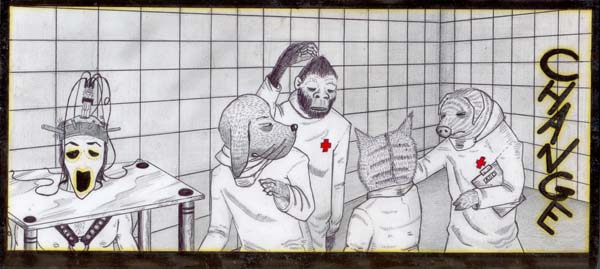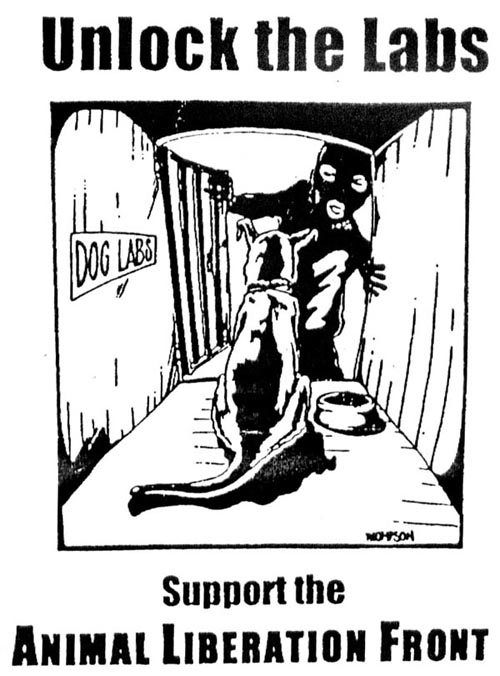|
|||||||||||||
|
and the Rights of Animals Humanity Interpreted By Punkerslut
Everyone who has come into contact with a living animal is aware that they are conscious, thinking beings. How much thinking they do may be debated, but it is not argued that they are capable of thought. Personal experience is enough to verify that they can have feelings of happiness or pain, and however primitive, they have ways of expressing it. This is the same social instinct that gives us sympathy and understanding of how other human beings feel. It is because we can imagine ourselves of another, and consider their interests as though they were our own. The social instinct, then, is based on a conscientious union of all beings with the ability to feel. All life that is capable of suffering or joy, that can experience ecstasy or endure misery -- this is where our sympathy comes from. We feel for others, only because they are capable of feeling like us in some way. In popular morality, we are taught to obey the instinct in respecting other people. We are taught to be honest and fair, polite and friendly. But the social instinct is curtailed when it comes to animal life. We are not taught to be sympathetic and just to animalkind -- we are taught to eat them. "Animals hold a lower value of life, a lower place that is worth less than humanity." This is the doctrine of humanity's domination over all living creatures. It is a teaching found in the schools, universities, churches, courthouses, and parliaments. The individual's social impulse is natural and comes with growing up in the community. But it is natural for all living creatures. With this type of instruction, there is a mutilation of the conscience. There is a weakening of our ability to translate our sympathy to fair and just behavior with others. The first rule about the right to life is that it applies to some and not to others. It is acceptable as a right for humanity, but it is withdrawn as a right for animals. There is a hidden lesson here that everyone absorbs: we, as human beings, have decided to take away the rights of animals. If we were so inclined, we would have every right to extend this to include human beings. We would extend the principle to the death penalty and foreign wars. There are some who would ask us to extend this principle to members of other religions, to citizens of other nations. There are German Nationalists who have believed in the inferiority of rights for all French people, just as there are French Nationalists who think the same of the Germans people. Religious fanatics, whether they call themselves Buddhist or Muslim or Christian, have similarly responded to those who are somehow different. In all of these groups, whether it is pro-death penalty or right-wing, white supremacists, we often hear this one phrase: "They're no better than an animal."
The principle of demoting the rights of animals extends further elsewhere. The mind does take in the idea that we have the right to place other living creatures on a lower level of consideration than us. Sometimes humans are brought to this level, as well. But beyond that, it also gives us the idea of hierarchy and domination. We certainly can place animals on the bottom level, with no right to life, but working up from there, there are other categories of rights. The CEO of a corporation, for instance, may feel no moral dilemma with having workers digging in an unsafe mine. They would describe such miserable, working conditions as "rugged individualism." The greatest prejudice of such a boss is to never reach down to doing the type of work that produces wealth -- they wouldn't be able to stand at an assembly line, and place some part inside of a cardboard box every five seconds. They have placed themselves in a category outside of the hard labor and poverty of those who bake their bread and build their homes. "Because of our cunning and intelligence, we are able to dominate over the animal kingdom. If this is acceptable, what is the problem with using the same tactics in dominating over the human civilization?" This the idea that the individual takes from devaluing animals. This is what they learn when by treating creatures as a source of food; this is what they take in when they eat food made from a slaughtered animal. Preachers call themselves "shepherds of the flock." Workers under their boss are called bees and citizens are often called lemmings. The domination that humanity has over animalkind translates into the social behavior we have with each other. Because we can take away all of the rights of animals, then we can take away some of the rights of people. The capitalist can hoard up the lands, make people beg for work, and then extract more than half of the worker's produce. The has rigged elections and trials, committed acts of terrorism, and mislead the public to start a war. By accepting the low place that animals must hold, we are accepting the premise of the idea -- that we can take away the rights of a group and benefit from it just because they're different. We can set up a pyramid of value. Certain groups have certain privileges and certain rights. It is within our will to dominate others that we are capable of controlling. This is the base message that comes with the culture that eats animals. Someone might look down on animalkind, offer some sympathy, and say, "I'm just glad that I'm not in your position." The reflection almost never occurs to them. Perhaps you are already in a position beneath someone else? Punkerslut,
|




